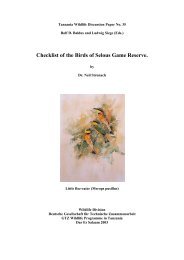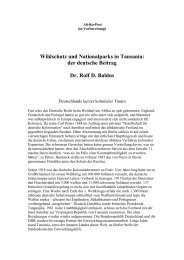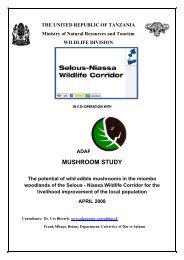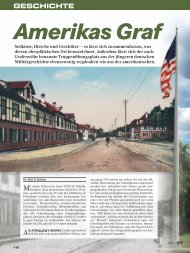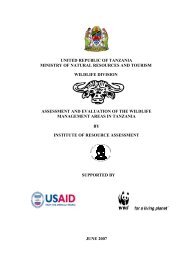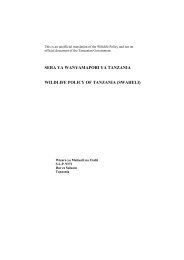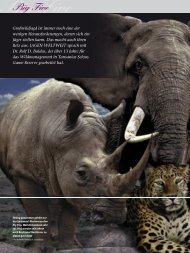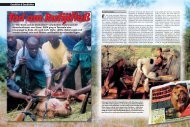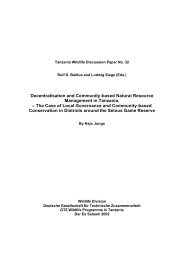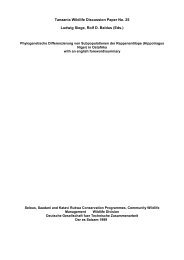African Indaba Articles - wildlife-baldus.com
African Indaba Articles - wildlife-baldus.com
African Indaba Articles - wildlife-baldus.com
You also want an ePaper? Increase the reach of your titles
YUMPU automatically turns print PDFs into web optimized ePapers that Google loves.
• Reviewing and revising policy, legislation, utilization and any other activities and institutionsthat may need to be updated.• Restructuring of the executive agency.• Introducing a structured training programme to meet the needs of both the executive agencyand personnel from the private sector, refurbishing the Mushandike staff training college,• Support to CAMPFIRE/CBNRM and the private <strong>com</strong>mercial <strong>wildlife</strong> sector• Rehabilitation of the protected areas and support to the field force including equipment,transport, <strong>com</strong>munication etc. in order to make the law enforcement force and the parkmanagers effective in the field again.8. Donor AssistanceRehabilitating the <strong>wildlife</strong> sector in Zimbabwe and assisting it to better serve the nation in general anddisadvantaged rural people in particular is a major challenge. It is an aspect of national development in whichpoor parts of Zimbabwe globally have an inherent <strong>com</strong>parative economic advantage. Growth in thispromising sector has been halted and reversed in recent years by destructive political elements with adetermination to cling to power at all costs. While considerable damage has been done it can be repairedand growth restarted in a viable and ethical <strong>wildlife</strong> industry relatively quickly, but this will need considerableoutside assistance in the form of both funding and expertise.Donors traditionally tend to focus on state/<strong>com</strong>munal/NGO sectors and to avoid the private sector. But theprivate sector has borne the brunt of the damage in the past few years and is going to need help to play itsrole in reconstruction.It is a venture with a high chance of success in environmental conservation, national and local in<strong>com</strong>egeneration, and the alleviation of poverty in geographically disadvantaged areas. It is the sort of situation inwhich donor assistance is likely to be cost effective in a high profile demonstration of measures to advancethe welfare of poor people while also conserving the biosphere and the biodiversity on which futureprosperity on a broad geographical front is likely to depend. It is a matter of helping to restore, upgrade andimplement a home grown institutional framework that has already been successfully but needs help to takeoff afresh. The former <strong>wildlife</strong> sector probably earned the equivalent of over US$300 million p.a. andbenefited at least 5% of the total population of Zimbabwe who received cash directly from the industry. It isdoubtful if the surviving remnants of the industry are earning as much as US$100 million. The aim should beto restore the lost US$200 million in earnings and to grow this figure and those benefiting directly from<strong>wildlife</strong>.Tourism is one of the sectors of an economy that can most quickly be turned around and thus play animportant role in the reconstruction of the country.It is desirable that interested donors should start now to plan for a <strong>wildlife</strong> sector support programme andshould not wait until a democratic government is in place. As soon as possible they should <strong>com</strong>mitthemselves to a joint co-ordinated effort to achieve the desired objectives and should form themselves into asteering team. It is also desirable that this team should plan and agree its strategy for action early enough tobe in a position to take immediate action as soon as possible. This is necessary for ensuring that thetransitional period of damaging confusion between governments is minimised. To this end the donors shouldalso identify a pool of key technical assistance personnel who can be fully briefed in confidence andmobilised for deployment in Zimbabwe as soon as possible after the formation of a new government. Giventhe high level of indigenous experience which once existed in the country, it is more important to revive thisand bring it back into the sector instead of employing expatriate staff from abroad.AbbreviationsCAMPFIRE – Communal Areas Management Programme for Indigenous ResourcesCBNRM – Community Based Natural Resources ManagementCEO – Chief Executive OfficerDNP – Department of National Parks and Wildlife ManagementNPA - National Park and Wildlife Management AuthorityIUCN – World Conservation Union82



